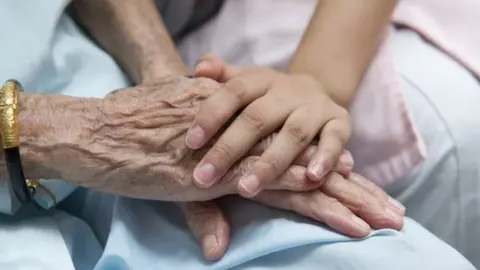Elder abuse 'a major issue' in Wales, warns charity
 Thinkstock
ThinkstockRadical action is needed to protect older people in Wales from abuse, a charity has warned.
Action on Elder Abuse Cymru said many abusers are going unpunished, and it is campaigning for tougher punishments.
Its survey found 12.5% of 500 people aged 65 and older had experienced some form of abuse.
The Older People's Commissioner for Wales, Sarah Rochira, said the matter must be addressed urgently.
The charity's research on older people showed:
- 6.7% had experienced psychological abuse, such as threats, intimidation and mockery
- 0.8% had experienced physical abuse such as hitting, slapping and spitting
- 3.3% had experienced financial abuse, such as misuse of power of attorney, theft and fraud
Older people's friends and relatives were also polled, and they observed more abuse than the older people themselves, which the charity said suggests older people are afraid to speak out.
Analysis was also carried out on the prosecution levels for crimes against older people in England and Wales. Out of the 3,012 cases recorded in 2015/16, just 0.7% resulted in a successful criminal conviction.
The charity is campaigning for tougher penalties for those who abuse older people by making it an aggravating factor for sentencing.
Action on Elder Abuse Cymru director, Rachael Nicholson-Wright said their research confirms that elder abuse in Wales is a "major issue" and "radical action is required if we are to prevent thousands of our loved ones from continuing to suffer appalling treatment".
She said the criminal justice system is "failing to deter abusers", describing the sentences passed down as "appallingly flimsy".
She added Operation Jasmine in south Wales demonstrated that "we must remain vigilant about the failing of some providers to care for our family members".
The Older People's Commissioner, Ms Rochira, said the research was an "important reminder that despite much good work in recent years much more still needs to be done to tackle elder abuse".
She said she will continue to hold safeguarding seminars to help professionals recognise the signs.
She added it was "essential" that older people are protected by the criminal justice system.
"A clear inequality currently exists in terms of conviction rates for abuse, meaning the law as it stands does not provide justice for older people nor a suitable deterrent to those who abuse older people."
This must be "addressed as a matter of urgency," she said.
